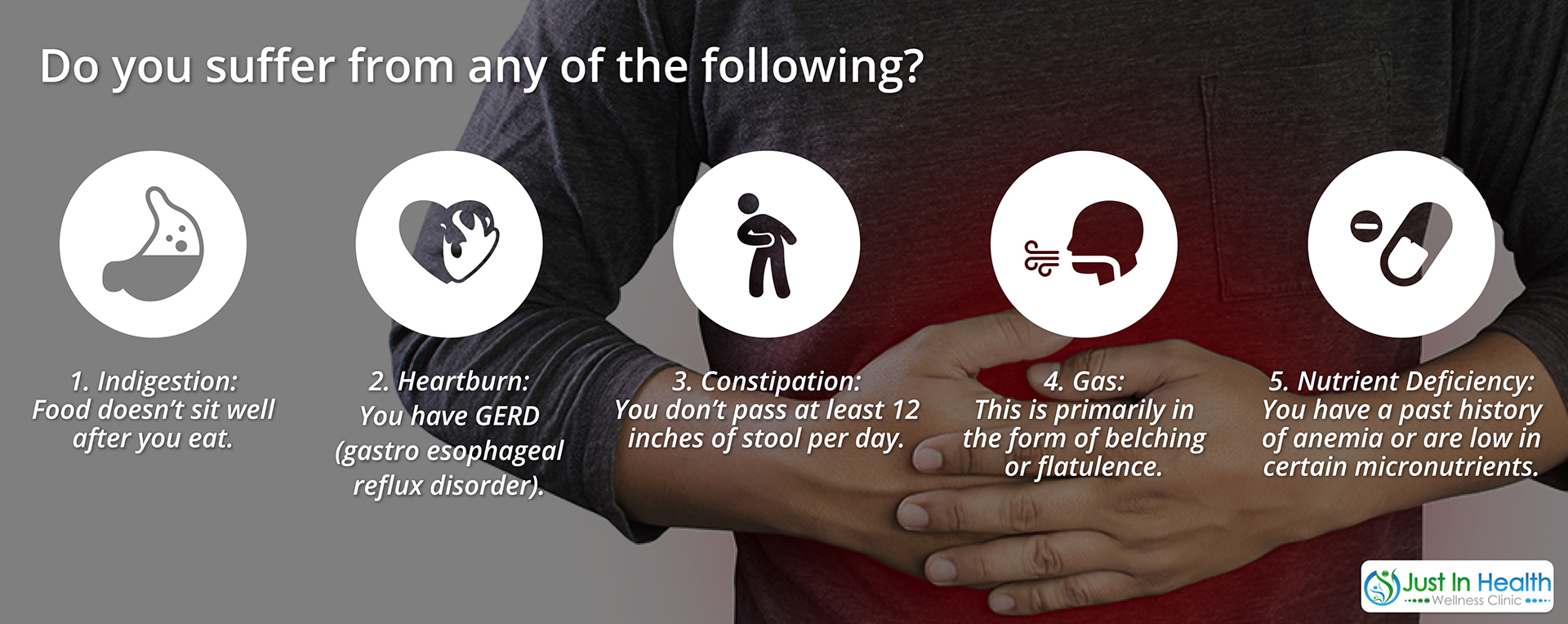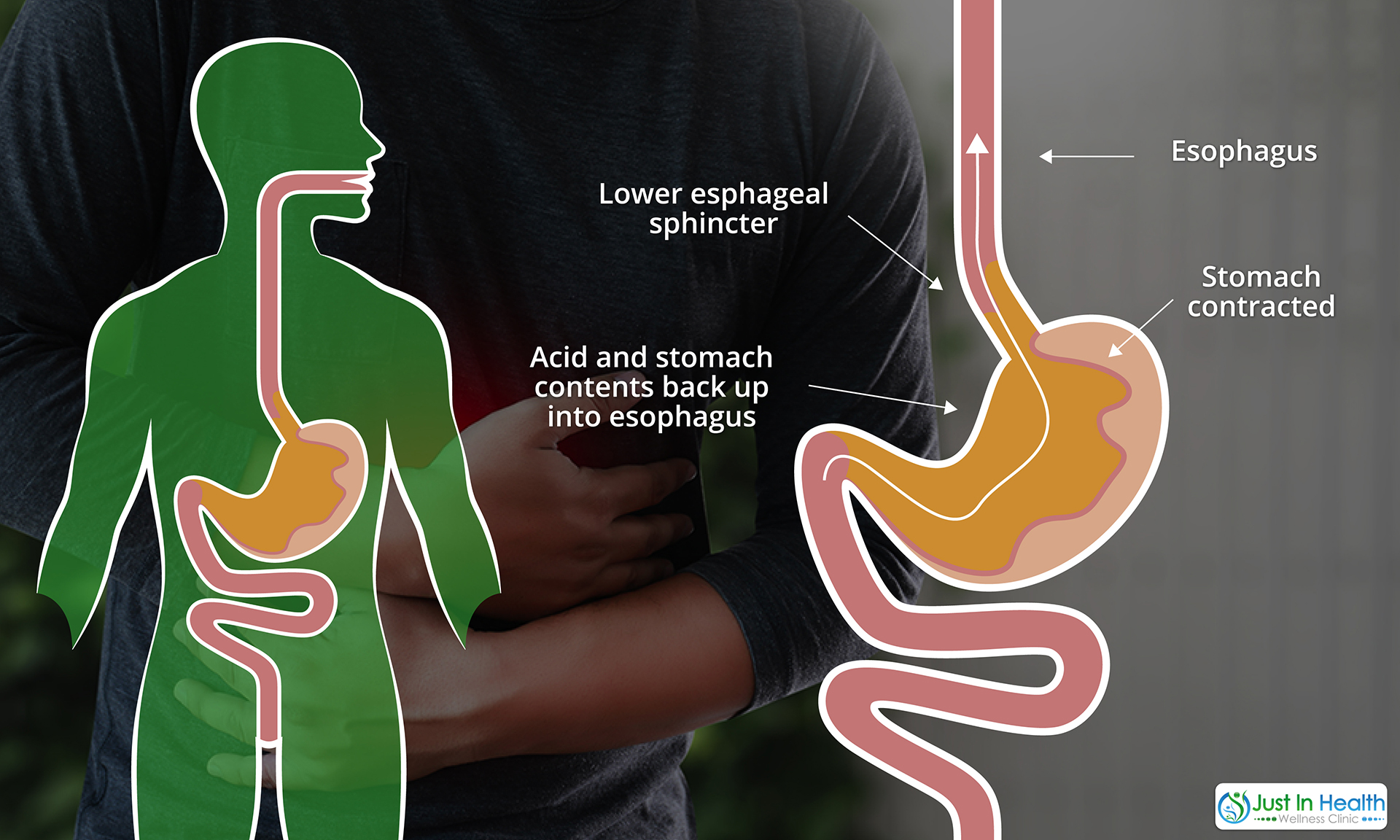
By Dr. Justin Marchegiani

Your body produces hydrochloric acid (HCl) for these primary purposes:
HCl is really, really important to start the domino cascade of healthy digestion. If that first digestive domino isn't knocked over, it's safe to say you are at a higher risk of digestive symptoms.
As mentioned above, HCl activates enzymes in the stomach, small intestine, and pancreas to start breaking down carbohydrate, protein, and fat. If HCl secretion isn't initiated in the stomach, you will start to see a putrification, or rotting, of the proteins; fermentation of carbohydrates; and a rancidification of fats (1).

When the enzymes that are needed to break down these foods aren't present, we start to see malabsorptions occur. These malabsorptions cause an increased intra-abdominal pressure, which can cause a weakening of the esophageal sphincter. When the esophageal sphincter loosens, this allows the organic acids from the rotting foods to rise up (reflux or GERD) and burn the esophageal tissue (2). Remember, esophageal tissue doesn't have the protection (mucus) from an acidic environment like the stomach does.
Essentially, low stomach acid provides the environment for bacterial overgrowth in the stomach/small intestine to occur, which then creates malabsorption. You are now set up for a vicious cycle of poor digestion that almost never improves on its own unless the underlying cause is addressed (3) .
When food isn't broken down completely, gas in the form of belching or flatulence is common. A dependency on pharmaceutical medications, like acid blockers, is now created that doesn't address the underlying problem and only creates even bigger problems down the road, like B12 or iron anemias to name only a few (6). In my clinical experience, HCl helps reverse these conditions and improve digestion; therefore, decreasing stomach acid in the long run with drugs isn't a good idea most of the time.
Yep, you heard it here first! Most people associate stomach acid as a problem. Yet stomach acid is needed for the stimulation of mucus from pyloric glands. This mucus acts as a shield against the stomach acid and protects the gastric mucosa.
The pyloric glands secrete mainly mucus for protection of the pyloric mucosa from the stomach acid. They also secrete the hormone gastrin.
~Guyton's Text Book of Medical Physiology, 11th edition.
The more your digestive track loses the ability to break down protein, fats, and carbohydrates, the greater the chance for a bacterial overgrowth to occur. As the balance of bacteria becomes more dysbiotic (more bad bacteria in relation to good), this can weaken your esophageal sphincter as mentioned above and allow burning in the esophagus to occur.

As the ratio of good bacteria and bad bacteria becomes flipped in favor of bad bacteria, all kinds of bad things occur. We start to see incomplete digestion, which has an effect on motility. The excess of bad microbes in the GI tract can produce chemicals that slow down peristalsis, or the wavelike contractions that move food through your intestines. If you have more bad bugs in your gut, your transit times get slower (4).
Most people I see with digestive symptoms have some sort of gut infection, either H. pylori or a myriad of other parasites that are notorious for causing these types of issues. Unless these infections are addressed, these digestive symptoms tend to linger. To learn more about how you can address these issues, click here!
Chronic constipation can also be connected to hypothyroidism as well. I strongly recommend ruling out any potential thyroid imbalances as well.
HCl is needed to ionize minerals so they can be absorbed, assimilated, and utilized. There have been studies showing nutrient deficiencies in calcium, iron, and B12 when low stomach acid is present. Low stomach acid can even increase your chance of osteoporosis as well (5,6).
One of the most underutilized supplements is HCl, especially if you are already spending a good deal of money on organic food; you want to make sure you are absorbing and assimilating it properly. The old adage “you are what you eat” isn't true. “You are what you eat, digest, assimilate, absorb, and utilize!”
If you have serious gastrointestinal irritation or a history of ulcers, you should not add any HCl into your supplement regimen without the guidance and support of a skilled functional medicine doctor. Some patients need more enzymes and gut healing herbs and nutrients before any HCl is introduced. This is on a case-by-case basis.
Physiology References:
Guyton's Text Book of Medical Physiology, 11th edition.